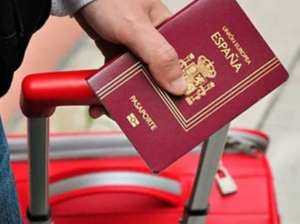
The Cabinet of Ministers has set new deadlines for foreigners with expired residence permits to apply for exchange of the document.
According to the decree № 141 from February 5, it is established that foreigners and stateless persons, except for citizens of the Russian Federation, who have a residence permit, the term of application for the exchange of which came after February 24, 2022, should within 90 days from the date of entry into force of this decree to apply for the exchange of such a residence permit.
It is determined that this Decree shall enter into force three months after its publication.
In addition, the State Migration Service is instructed within three months from the date of entry into force of this decree to provide information and awareness-raising work aimed at informing foreigners and stateless persons about the procedure and terms of exchange of temporary residence certificates, the deadline for applying for the exchange of which came after February 24, 2022.

According to Serbian Economist, Montenegro is tightening the requirements for obtaining and extending temporary residence permits (TRPs) for foreigners on two popular grounds: property ownership and business management. The law on amendments to the Law on Foreigners has been published in Službeni list Crne Gore (No. 3/2026).
In the parliamentary amendments that became part of the final text, the minimum ‘cost’ of a property for a residence permit on the basis of real estate ownership is set at no less than €150,000. The decision of the tax authority (the basis for property tax) is indicated as confirmation, and the rule does not apply to citizens of the EU, EEA and Switzerland.
It is noteworthy that the government’s initial proposal set a higher threshold of €200,000 and was linked to the tax authority’s assessment; it was this level that had previously sparked debate in the business community and among real estate market participants.
The authorities have reformatted their approach to extending residence permits for entrepreneurs and executive directors. The relevant parliamentary committee noted that the government had made amendments removing the requirement for Montenegrin citizens to be employed as a condition for extension and replaced it with the need to provide proof of paid tax obligations in the minimum amount of €5,000 per year.
The ‘real estate – residence permit’ link remains in place, but there is now a clear price filter that may shift demand to properties priced at €150,000 and above, especially in coastal and central municipalities. At the same time, the risk of imbalance for the north of the country, where prices are lower, was previously highlighted in parliamentary discussions as a sensitive issue for the regions.
For small businesses, the new model looks more predictable: instead of formal hiring, a measurable criterion of ‘taxes not less than €5,000’ is introduced, which potentially lowers barriers for companies without the need to expand their staff, but strengthens fiscal discipline.
Reference: the government explained the package of amendments as necessary for further alignment with EU migration regulations.

In France, new requirements for a number of procedures related to multi-year residence permits, 10-year resident cards, and citizenship have come into force on January 1, 2026: language thresholds have been raised and a mandatory citizenship exam has been introduced.
According to explanations from French government resources, the first multi-year residence card (carte de séjour pluriannuelle) now requires proof of French language proficiency at a level of at least A2, and for the first 10-year residence card – no lower than B1 (in particular, for applicants under 65 years of age in categories covered by the rule).
For procedures for accessing French citizenship, from January 1, 2026, language requirements will be raised to level B2, according to information from the French Ministry of the Interior.
In addition, from January 1, 2026, passing the citizenship exam will become mandatory for naturalization, as well as for the first application for a long-term residence permit or resident card for citizens of non-EU countries. The exam lasts up to 45 minutes, includes 40 multiple-choice questions, and is considered passed with a score of at least 80% (at least 32 correct answers).
Service-Public specifies that the exam is not required when renewing a long-term card or residence card, and does not apply, in particular, to beneficiaries of international protection.

The number of foreigners with valid residence permits in Turkey as of December 31, 2025, was 1,151,969, according to statistics from the Presidency of Migration Management of the Turkish Ministry of Interior.
Compared to the end of 2024, the figure increased by 95,337, or approximately 9%.
The structure of residence permits by type in 2025 includes 426,926 short-term permits, 220,434 student permits, 168,455 family permits, and 336,154 permits of other categories.
According to data on distribution by province, more than half of all foreigners with residence permits live in Istanbul – 579,932. Next are Antalya (109,571) and Ankara (73,263).
In terms of citizenship, Ukraine is in the top 10 for short-term residence permits (21,257) and in the top 10 for family residence permits (6,505).
The Migration Directorate reminds that foreigners planning to stay in the country longer than the visa or visa-free regime period, i.e., more than 90 days, must apply for the appropriate residence permit through the electronic system, and reference information can be obtained through the YIMER center (157 within Turkey).

Ukrainians are not among the ten largest groups of foreigners with valid residence permits (RP) in Turkey as of December 25, 2025, according to the latest statistics from the country’s migration service.
According to the agency’s data, as of that date, there were a total of 1,137,023 foreigners residing in Turkey on the basis of a residence permit.
Citizens of Turkmenistan (166,292) and Azerbaijan (90,942) lead the way, followed by citizens of Syria (77,709) and Iran (73,534). Russians rank fifth in this rating (72,548 thousand), which means they have lost their leading position amid the growth of other countries’ share.
In terms of types of residence permits, the migration service indicates that as of December 25, 2025, short-term residence permits amounted to 419,759 thousand, student permits – 216,564 thousand, family permits – 166,539 thousand, and other categories – 333,969 thousand.
The primary source of this data is the current statistics section of the Turkish Migration Service (Göç İdaresi Başkanlığı) with an update date of 12/25/2025.

According to data from the Permanent Immigration Monitoring Center (OPI) under the Spanish Ministry of Social Policy and Migration, as of September 30, 2025, 7,426,481 foreign citizens had valid residence permits in the country. This is 4.5% more than a year earlier.
Of this number, 54% (about 4 million people) are citizens of EU, EFTA, and UK countries who have an EU citizen registration certificate or a TIE foreigner card under the UK’s withdrawal agreement from the EU. The most numerous nationalities in this group are Romanians, Italians, and British: they account for 51% of all European residents.
The Ukrainian community stands out as a separate block in the statistics. According to data based on official statistics from the Spanish Ministry of Social Policy and Migration, as of September 2025, more than 326,000 Ukrainian citizens have a valid residence permit in the country. A significant portion of this number are people who received protection under the EU Temporary Protection Directive, introduced after the full-scale invasion of Ukraine by the Russian Federation in February 2022.
The growth of the Ukrainian diaspora was particularly sharp in 2022–2023, but slowed significantly in 2024–2025: while the annual increase at the height of the war was measured in triple digits, by the fall of 2025 it had fallen to single digits.
After Brexit, the British remain one of the three largest European communities in Spain, alongside the Romanians and Italians. The official OPI report does not provide the exact number of British citizens in its public summary, but emphasizes that these three nationalities account for more than half of all residents from the EU/EFTA and the UK.
A characteristic detail is the age profile of the British diaspora. The average age of British residents is significantly higher than the average among foreigners and is around 57, reflecting Spain’s popularity as a country for retirees and a “second home” for British citizens.
Thus, by the end of 2025, Spain will remain one of the key EU countries in terms of the number of permanent foreign residents, and the structure of migration will gradually shift: European communities will continue to dominate, but citizens of Ukraine and Latin American countries will play an increasingly important role.
http://relocation.com.ua/more-than-326000-ukrainian-citizens-have-a-valid-residence-permit-in-spain/